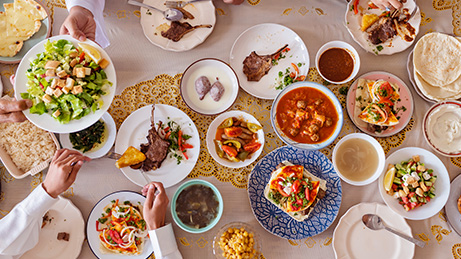Contents
Ramadan food – Elements of iftar and suhoor food
Ramadan is the holy month of prayer, reflection and fasting. To fast better, it is vital to know how to sustain the body during fasting hours and throughout the fasting month. Here’s a complete guide to Ramadan food ideas.
Suhoor meal vs iftar meal
Suhoor and iftar meals are completely different, consumed at specific times and they both serve a specialized purpose. Suhoor is consumed before sunrise and aims at sustaining the body through fasting whereas iftar serves to break the fast in the evening. Since these meals are all that is consumed repeatedly over the span of a month, you have to make sure that they are balanced and include the nutrition you will need to stay healthy during Ramadan and after.
Here is a list of 10 food items that must be part of your Ramadan food choices; along with Hafla’s reasons for putting them on the list.
Elements of an ideal suhoor meal
The goal of suhoor meal items should be to sustain you through the day, keep your energy levels high and be nutritious. They should not make you feel thirsty so it would help to avoid excessive salt and spices in the suhoor meal. Suhoor foods must be substantial in quantity to keep you full, essentially water-rich for hydration and rich in carbohydrates to provide a continuous release of sugar into the system throughout the day.
- Yoghurt helps maintain bone health, boost immunity and aid digestion.
- Hummus, because of ingredients like chickpeas and tahini, provides the body with a host of nutrients and energy.
- High protein items like chicken and fish help maintain body tissue while low-fat dairy products are protein-rich and improve immunity and bone health.
- Water-rich fruits like watermelon, oranges and kiwi hydrate the body and supply it with essential vitamins, minerals and nutrients.
- Carbohydrate-rich foods like brown rice and whole meal bread which are high in fiber, help maintain sugar levels, aid digestion and sustain energy levels for longer.
Elements of an ideal iftar meal
Iftar meals should typically be sumptuous but moderately sized and well balanced. Design your iftar menu to lean equally towards carbohydrates, water-rich greens and proteins to provide a feeling of satiation, hydration and for a balanced diet. Water is an essential requirement for any iftar meal – not sweet juices, powder mixes and other flavored drinks. Artificially sweetened drinks only serve to cause sugar spikes without providing any real benefit.
- Dates are high in fructose and glucose and help restore low blood sugar. They also add vitamins and minerals which are the first to be depleted while fasting. If you don’t have dates, use fruits with similar properties such as apples, figs or pears.
- Colored or green leafy vegetables, cooked or as salad, are the best choice for a healthy supply of minerals and nutrients.
- Protein in the form of meats, eggs and dairy is required for tissue repair, maintenance and building.
- Carbohydrates maintain blood sugar levels. Complex carbs like whole grain pasta, whole meal bread and brown rice work well for iftar meals.
- Drink a bowl of soup. Soups are rich in water and flavorful and you can choose from vegetable, tomato or lentil soup for variety.
Experience Hafla
During Ramadan, staying full during the day and healthy through the month may seem like an uphill task; given physical hurdles like headaches, hypoglycemia, dehydration, weakness, nausea and sleep deprivation. This makes choosing what you eat and when you consume it very important. Let Hafla help with Ramadan nutrition with its wide variety of suhoor and iftar meal packages, boxes and offers.
Make the right choice and enjoy the festivities to the fullest.
Happy Ramadan!
